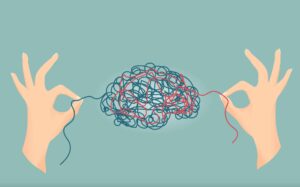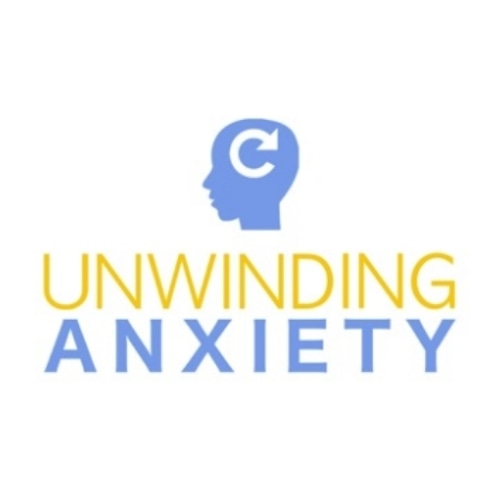Anxiety can be a debilitating condition that affects people of all ages. It can make it difficult to go about your day-to-day life, and can often feel like there is no escape from the constant worrying and stress. If you are struggling with anxiety, you are not alone. In this guide, we will discuss some techniques that can help you with unwinding anxiety and let go of the anxiety that is holding you back.
Contents
- 1 Understanding Anxiety
- 2 How Do You Unwind Anxiety?
- 2.1 Break The Cycle Of Anxiety
- 2.2 Talk to someone who understands
- 2.3 Identify your triggers
- 2.4 Challenge your anxiety
- 2.5 Try exposure therapy
- 2.6 Start small
- 2.7 Don’t avoid things that make you anxious
- 2.8 Challenge your negative thoughts
- 2.9 Practice visualization
- 2.10 Create a healthy routine
- 2.11 Try relaxation techniques
- 2.12 Let go of perfectionism
- 2.13 Identify your core values
- 3 Conclusion
Understanding Anxiety
 Anxiety is a normal emotion that we all experience at one point or another. It’s our body’s way of preparing us to face a challenging situation. In small doses, anxiety can be helpful, but when it’s constant or overwhelming, it can be debilitating.
Anxiety is a normal emotion that we all experience at one point or another. It’s our body’s way of preparing us to face a challenging situation. In small doses, anxiety can be helpful, but when it’s constant or overwhelming, it can be debilitating.
If there is excessive, irrational fear or worry. People with anxiety disorders may experience physical symptoms like shaking, sweating, and a racing heart. They may also have trouble sleeping, concentrating on tasks, or feeling dizzy and lightheaded.
How Do You Unwind Anxiety?

The first step is acknowledging that you have anxiety. This seems like an easy task, but for many people, it’s not. Acknowledging that you have anxiety means that you’re also admitting that you can’t always control your thoughts and feelings. This can be a difficult pill to swallow, but it’s an important first step.
Break The Cycle Of Anxiety
If you’re someone who struggles with anxiety, you know how tough it can be to break the cycle of anxious thoughts. You might feel like you’re stuck in a never-ending loop of worry and stress. But there are ways to break free from the grip of anxiety. Here are some tips to help you unwind from anxiety and find peace of mind.
Talk to someone who understands
This can be a friend, family member, therapist, or any other support system. Talking openly about what you’re feeling can help you process and release some of the anxiety. For instance, if you’re feeling anxious about an upcoming presentation, talk to someone who has been in your shoes and can offer some words of wisdom.
Identify your triggers
Identifying your anxiety triggers is the first step to managing them. Once you know what sets off your anxiety, you can start to make a plan for how to deal with it. Anxiety is often triggered by something specific. It could be a person, place, thing, or situation that sets off your anxiety. Once you identify your triggers, you can start to avoid them or be better prepared to deal with them. If you know that’s your trigger, you can try to avoid situations that would put you in a large group. Or, if you can’t avoid them, you can prepare yourself by mentally going through the situation beforehand and coming up with a plan for how to deal with it.
Challenge your anxiety
Anxiety can often be irrational. That means that the things you’re anxious about may not be as bad as you think they are. One way to challenge your anxiety is to ask yourself what the worst possible outcome of the situation could be. Then, ask yourself if that outcome is likely to happen.
Another way to challenge your anxiety is to think about how you would cope if the worst possible outcome did happen. Would you be able to handle it? Would you be okay? Chances are, the answer is yes.
Try exposure therapy
If your anxiety is severe, you may want to consider exposure therapy. This is a type of therapy that involves gradually exposing yourself to the things you’re anxious about. The idea is that by facing your fears, you’ll eventually be less afraid of them.
Exposure therapy can be done with the help of a therapist, or you can do it on your own. If you’re going to do it on your own, it’s important to make sure that you expose yourself to things that are challenging for you. Otherwise, exposure therapy won’t be effective.
Start small
If you’re feeling overwhelmed, start small. Choose one thing that you’re anxious about and focus on that. Don’t try to do too much at once. One thing you can do is make a list of the things that make you anxious. Then, start with the item that’s causing you the least amount of anxiety. Work your way up to the items that are causing you more anxiety.
Don’t avoid things that make you anxious
It can be tempting to avoid the things that make you anxious. But avoidance only makes anxiety worse in the long run. It’s important to face your fears. For example, if you’re afraid of flying, the best way to deal with that fear is to fly. The more you do it, the less anxious you’ll feel.
The same goes for public speaking. If the thought of getting up in front of a group makes your heart race, don’t avoid it. Sign up for a Toastmasters club or offer to give a presentation at work. The more you do it, the easier it will become.
Challenge your negative thoughts
Anxiety can often cause us to have negative and distorted thinking. Challenging these thoughts can help us to see things in a more realistic and positive light. When you find yourself having negative thoughts, try to come up with three alternatives, more positive explanations for the situation. For example, if you are anxious about an upcoming test, instead of thinking “I’m going to fail,” try thinking “I studied hard and I am prepared,” or “I can do this.”
Practice visualization
Visualization is another helpful relaxation technique. To do visualization, close your eyes and imagine yourself in a peaceful place. This could be anywhere that makes you feel happy and relaxed, such as a beach, a forest, or even your backyard. Picture every detail of this place in your mind, from the sounds to the smells.
Create a healthy routine
A healthy routine can help to ground you and provide some stability in your life. This might include:
regular exercise, eating a balanced diet, getting enough sleep, and spending time in nature.
Get moving: Exercise is a great way to reduce stress and tension in your body. It also helps to clear your mind and improve your mood. Taking a brisk walk, going for a swim, or taking a yoga class are all great ways to get moving and reduce anxiety.
Eating a balanced diet: One way to help reduce anxiety is by eating a balanced diet. This means consuming an adequate amount of all the essential nutrients your body needs to function properly. Eating a healthy diet can improve your mood and energy levels, and help you cope with stress more effectively. Certain foods are particularly helpful for reducing anxiety. These include omega-three fatty acids, probiotics, magnesium-rich foods, and chamomile tea.
Journalizing: Writing down your thoughts and feelings can help you to make sense of them and start to let them go. You might want to keep a journal or write letters that you never send.
Try relaxation techniques
Many different relaxation techniques can help to reduce anxiety. Some popular ones include breathing exercises, progressive muscle relaxation, visualization, and yoga. Experiment with different techniques to see what works best for you. For example, deep breathing is a simple yet effective relaxation technique that can be done anywhere.
Deep Breathing: To do deep breathing, sit in a comfortable position and close your eyes. Place one hand on your stomach and the other on your chest. Slowly inhale through your nose, feeling your stomach rise. Then exhale slowly through your mouth, feeling your stomach fall. Continue this breathing pattern for several minutes.
Muscle relaxation: If you’re feeling especially anxious, you can also try progressive muscle relaxation. This technique involves tensing and relaxing different muscle groups in your body. Start by tensing your toes for a few seconds, then relax them. Work your way up to your calves, thighs, stomach, arms, neck, and face.
Yoga: It is a great way to reduce anxiety. Many different yoga poses can help to calm and relax the body and mind. For example, a child’s pose is a restful position that can be done anywhere. To do the child’s pose, start on your hands and knees with your feet together and your toes touching.
Let go of perfectionism
Perfectionism is often a cause of anxiety. Letting go of the need to be perfect can help to reduce your anxiety levels. For example, if you’re anxious about a presentation at work, remind yourself that it’s okay to make a mistake or two. Focus on the process, not the outcome. For instance, you might say to yourself, “I’m doing the best I can” or “I’m giving it my all.”
Identify your core values
Your core values are the things that are most important to you in life. When you know what they are, you can start living in a way that aligns with them. This can help you let go of anxiety and stress because you’ll be living according to your values instead of someone else’s. Some people have a hard time identifying their core values. Once you’ve identified your core values, start making them a priority in your life. This doesn’t mean you have to quit your job and move to the middle of nowhere. But it does mean living with intention and making choices that align with your values. When you live according to your values, anxiety will naturally start to fall away because you’ll be at peace with yourself. You’ll also be more likely to attract people and experiences.
These are just a few of the many ways that you can start to unwind from anxiety. Remember, it’s important to take things one step at a time. Making even small changes can have a big impact on your overall anxiety levels. So, start with one or two of these. Remember, anxiety is a normal part of life. Everyone experiences anxiety from time to time. The key is to find healthy ways to deal with it. When you do, you’ll be able to live a more peaceful and fulfilling life.
Conclusion
It may be concluded that anxiety is not necessarily a bad thing. It is only when it gets out of control that it can cause problems. There are many ways to unwind from anxiety, and it is important to find the one that works best for you. If you feel like your anxiety is getting out of control, or if it is causing you significant distress, please consult a mental health professional.
For further information and suggestions, please contact Therapy Mantra. We have a team of expert therapists and psychiatrists that can help you overcome this problem. Get in touch with us right away to learn more about our services. You may also make an online therapy session or download our free Android or iOS app.


